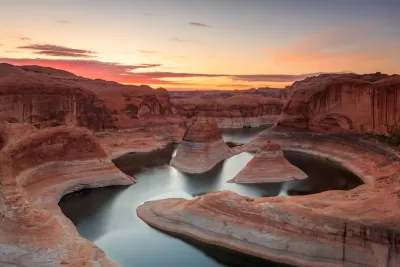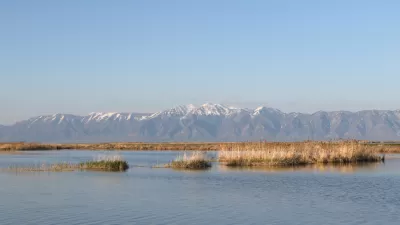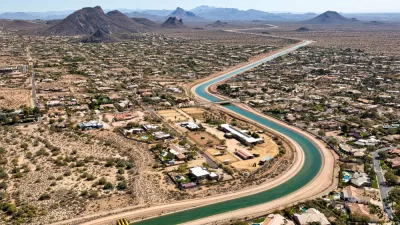The reservoir on the Colorado located above the Grand Canyon is dropping fast. A new study proposes a contingency plan to reduce the risk of catastrophe.

Tony Davis shares the news of a new study warning that Lake Powell "could virtually dry up in as few as six years if the region gets a repeat of the dry spell it experienced from 2000 to 2005." The lake was almost full prior to the drought during that time period—this time its only half full (depending on how you look at it).
According to Davis, the lake is already only 85 feet above a threshold that would trigger Upper Basin states (i.e., Colorado, New Mexico, Utah, and Wyoming) delivering water from other reservoirs into Lake Powell. Thirty-five feet lower than that and "there wouldn’t be enough water flowing through Glen Canyon Dam’s turbines to generate power."
The study also includes the beginnings of a contingency plan that would create a "three-legged stool" to protect the reservoir.
One leg would involve reducing water demand by farmers and cities in the Upper Basin. The second would step up cloud-seeding programs to try to boost snowfall in the region. The third would transfer some water stored in the smaller Upper Basin reservoirs to Lake Powell.
The feature-length article includes a lot more detail about the function of Lake Powell, including sections about the reservoir's primary purpose as a storage facility and the unprecedented climate trends of recent years
A collection of water districts and groups financed the study.
FULL STORY: Lake Powell could dry up in as little as six years, study says

Maui's Vacation Rental Debate Turns Ugly
Verbal attacks, misinformation campaigns and fistfights plague a high-stakes debate to convert thousands of vacation rentals into long-term housing.

Planetizen Federal Action Tracker
A weekly monitor of how Trump’s orders and actions are impacting planners and planning in America.

San Francisco Suspends Traffic Calming Amidst Record Deaths
Citing “a challenging fiscal landscape,” the city will cease the program on the heels of 42 traffic deaths, including 24 pedestrians.

Defunct Pittsburgh Power Plant to Become Residential Tower
A decommissioned steam heat plant will be redeveloped into almost 100 affordable housing units.

Trump Prompts Restructuring of Transportation Research Board in “Unprecedented Overreach”
The TRB has eliminated more than half of its committees including those focused on climate, equity, and cities.

Amtrak Rolls Out New Orleans to Alabama “Mardi Gras” Train
The new service will operate morning and evening departures between Mobile and New Orleans.
Urban Design for Planners 1: Software Tools
This six-course series explores essential urban design concepts using open source software and equips planners with the tools they need to participate fully in the urban design process.
Planning for Universal Design
Learn the tools for implementing Universal Design in planning regulations.
Heyer Gruel & Associates PA
JM Goldson LLC
Custer County Colorado
City of Camden Redevelopment Agency
City of Astoria
Transportation Research & Education Center (TREC) at Portland State University
Jefferson Parish Government
Camden Redevelopment Agency
City of Claremont





























